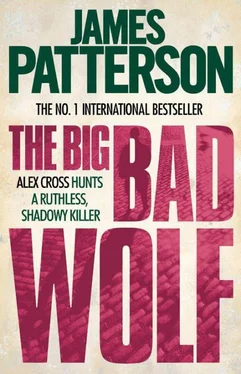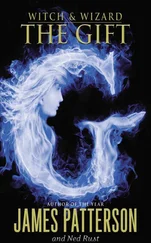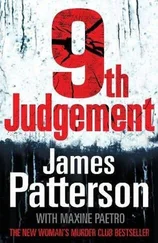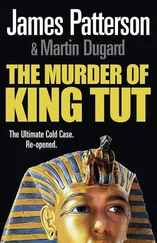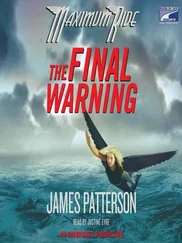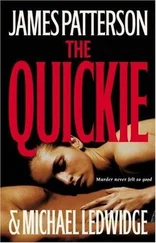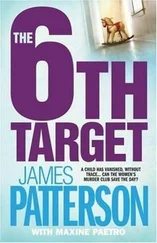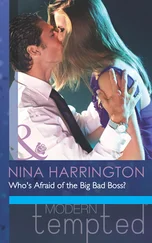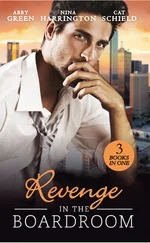Before the shock of the gun blast faded, the three men took off running very fast. Two of them galloped toward Boylston, but the blond who’d shot Paul Gautier sprinted out on to Park Drive.
He was a big man, but he was motoring. I remembered hearing from Monnie Donnelley that great Russian athletes, even former Olympians, were sometimes recruited into the Mafia. Was blondie a former jock? He moved like it. The confrontation, the shooting and everything else, reminded me of how little we knew about the Russian mobsters. How did they work; how did they think?
I took off after him, an overload of adrenaline rocketing through my body. I still couldn’t believe what had happened. It could have been avoided. Now Gautier was possibly dead, probably dead.
I ran as I shouted, ‘Take them alive!’ It should have been obvious, but the other agents had just seen Paul Gautier gunned down. I didn’t know how much street action, or combat, any of them had seen before. And we desperately needed to question the kidnappers once we caught them.
I was getting winded. Maybe I needed more time in the physical-training classes at Quantico, or maybe it was because I’d spent too much time sitting around inside the Hoover Building these past few weeks.
I chased the blond killer through a tree-lined residential area. A moment later, the trees cleared and the towers of the glittering Prudential Center and the Hancock loomed ahead. I glanced back. Three agents trailed behind, including Peggy Katz, who had her gun out.
Then the man running ahead of me turned on to Boylston Street. He was approaching the Hynes Convention Center with four FBI agents racing behind. I was closing a little ground on him, but not enough. I wondered if maybe we’d gotten lucky: could this be the Wolf up ahead? He was hands-on, right? If it was – then we had him for murder . Whoever he was – he was still moving well. A long-distance sprinter .
‘Stop! We’ll shoot!’ one of the agents yelled behind me. The blond Russian didn’t stop. Suddenly he made a sharp, sliding turn down a side street. It was narrow and darker than Boylston. One-way. I wondered if he’d thought about his escape route before this. Probably not.
The extraordinary thing – he hadn’t hesitated when he shot Agent Gautier. I don’t bluff , he’d said. Who would murder so casually? With so many FBI watching?
The Wolf? He was supposed to be fearless and ruthless, maybe even crazy. One of his lieutenants?… How did the Russians think?
I could hear his shoes slapping down hard on the pavement up ahead. I was gaining on the Russian a little, getting a second wind.
Suddenly he whirled around – and fired at me!
I threw myself down on the ground fast. But then I was up just as quickly, chasing after him again. I’d clearly seen his face – broad, flat features, dark eyes, late thirties to early forties.
He turned again – planted – fired.
I ducked behind a parked car. Then I heard a scream. I whirled around and saw an agent down. One of the males. Doyle Rogers. The blond turned and started to run again. But I had my second wind and I thought I could catch him. Then what? He was ready to die.
Suddenly a shot rang out behind me! I couldn’t believe what I saw. The blond dropped face down, fell flat on his chest and face.
He never moved once he hit the ground. One of the agents behind me had shot him. I turned – and saw Peggy Katz. She was still in a shooting crouch.
I checked on Agent Rogers and found he’d only been hit in the shoulder. He’d be okay. Then I walked back alone toward the Fens. When I got there, I discovered that Paul Gautier was still alive. But the two other kidnappers had gotten away. They’d left their van, but commandeered a car on Park Drive. Our agents had lost them. Bad news, the worst.
The whole operation had blown up in our faces.
I don’t think that I’d felt this bad in all my years with the Washington P.D., maybe in all my years combined. If I hadn’t been sure before, I was now. I’d made a mistake in coming over to the FBI. The Bureau did things very differently from anything I was used to. They were by-the-book, by-the-numbers, and then suddenly they weren’t . They had tremendous resources, and staggering amounts of information, but they were often amateurs on the streets. There was some great personnel; and some incredible losers.
After the shootout in Boston I had driven over to the FBI offices. The agents who gathered there all looked shell-shocked. I couldn’t blame them. What a mess. One of the worst I’d seen. I couldn’t help feeling that Senior Agent Nielsen was the one responsible, but what did it matter, what good did it do to cast around blame? Two well-intentioned agents had been wounded; one had almost died. Maybe I shouldn’t have, but I felt partly responsible. I’d told the senior agent to move in on Paul Gautier faster, but he didn’t listen.
The blond man I’d chased down Boylston Street had unfortunately died. Katz’s bullet had hit him in the back of the neck, and it had taken out most of his throat. He’d probably died instantly. He carried no identification. His wallet held a little more than six hundred bucks, but not much else. He had tattoos of a snake, a dragon, and a black bear on his back and shoulders. Cyrillic lettering, that no one had deciphered yet. Prison tats. We assumed he was Russian. But we had no name, no identification, no real proof.
Photographs of the dead man had been taken, then sent to Washington. They were checking, so we had little to do in Boston until they called back. A few hours later, a Ford Explorer commandeered by the two other abductors was found in the parking lot of a bank in Arlington, Massachusetts. They had stolen a second vehicle out of the bank lot. By now they’d probably switched it for another stolen car.
A total screw-up in every way. Couldn’t have gone worse .
I was sitting in a conference room by myself, my face in my hands, when one of the Boston agents walked in. He pointed an accusatory finger my way. ‘Director Burns’s office on the line.’
Burns wanted me back in Washington – as simple and direct as that. There were no explanations, or even recriminations about what had happened in Boston. I guess I was to be kept in the dark a while longer about what he really thought, what the Bureau thought, and I just couldn’t respect that way of operating.
I got to the SIOC offices in the Hoover Building at six in the morning. I hadn’t slept. The place was humming with activity, and I was glad no one had time to talk about the shooting of the two agents in Boston.
Stacy Pollack came up to me a few minutes after I arrived. She looked as tired as I felt, but she put a hand on my shoulder. ‘Everybody here knows that you felt Gautier was in danger and tried to move in on the shooter. I talked to Nielsen. He said it was his decision.’
I nodded, but then I said, ‘Maybe you should have talked to me first.’
Pollack’s eyes narrowed. But she said nothing more about Boston. ‘There’s something else,’ she finally spoke again. ‘We’ve had some luck. Most of us have been here all night. The money transfer we made to the Wolf’s Den… we used a contact of ours in the financial world, a banker from Morgan Chase’s International Correspondent Unit. We were able to trace the money out of the Caymans. Then we monitored virtually every transaction to US banks with correspondent relationships. Had them screen all inbound wire payment orders. That’s where our consultant, Robert Hatfield, said it got tricky. The transaction zipped from bank to bank – New York, then Boston, Detroit, Toronto, Chicago, a couple of others. But we know where the money finally wound up.’
Читать дальше
